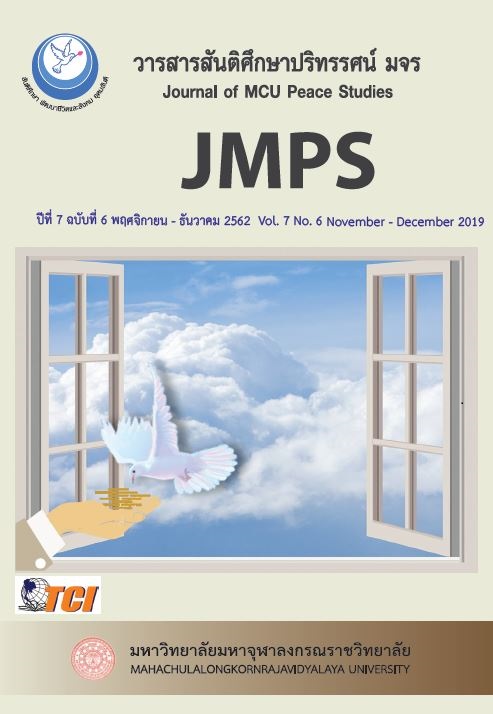Leadership Competencies in Turbulent Environment
Main Article Content
บทคัดย่อ
Leadership competencies, historically, could be ineffective when coping with a turbulent environment. The prime objective in this study was then to empirically propose 21st century leadership competencies. VUCA (volatility, uncertainty, complexity and ambiguity) concepts, crisis management and leadership competency theories, were used to frame the conceptual framework. The unit of analysis in this studying was Thai-listed companies across eight industries. To quantitative analysis, with 138 respondents, based on analysis of variance (ANOVA), it was shown that the types of industry were insignificant toward the level of VUCA, maturity of agile leadership and ways of managing crises. Regarding regression model, important managerial competencies for the 21st century are increased ability to determine both short and long term vision, capable to engage stakeholders, people-strategy and understanding new paradigm of management tools. Leaders who only understand day-to-day problem solving are not enough. Moreover, the most vital functional competencies for a future leader concluded from qualitative analysis is communication with trust as an initial response. Apart from communication skills, predictive, cognitive, digital and good networking skills are all necessary to fix the turbulent environment. The author then proposed a training roadmap for potential leaders.
Article Details
ทัศนะและความคิดเห็นที่ปรากฏในบทความในวารสาร ถือเป็นความรับผิดชอบของผู้เขียนบทความนั้น และไม่ถือเป็นทัศนะและความรับผิดชอบของกองบรรณาธิการ ยินยอมว่าบทความเป็นลิขสิทธิ์ของวารสาร
เอกสารอ้างอิง
Adam, W. 2015. Handbook of Practical Program Evaluation. (4th ed.). USA: John Wiley & Sons, Inc.
Aurini, J. D., Heath, M., & Howells, S. (2016). The how to of qualitative research: Strategies for executing high quality projects. Los Angeles: SAGE Publications, Inc.
Brodbeck, M. (1968). Reading in the Philosophy of Social Science. New York: MacMillan.
Committee of Sponsoring Organizations of the Treadway Commission (COSO). (2004). Enterprise Risk Management: Integrated Framework: Executive Summary & Framework. USA: COSO.
David, M. L. (2014). Integrating Qualitative and Quantitative Methods A Pragmatic Approach. Los Angeles: SAGE Publications, Inc.
Gill, R. (2006). Theory and Practice of Leadership. London: SAGE Publications, Inc.
Hair, J. F., Black, W. C., Babin, B.J., & Anderson, R. E. (2010). Multivariate Data Analysis: A global perspective. New York: Pearson.
Joiner, B., & Josephs, S. (2007). Leadership Agility Five Levels of Mastery for Anticipating and Initiating Change. USA: John Wiley & Sons, Inc.
MEJRI, M., & DE, W. D. (2013). Crisis Management: Lessons Learnt From the BP Deepwater Horizon Spill Oil. Business Management and Strategy, 4(2), 67- 90.
Milan, P., Emanuel, B., & Uroš, B. (2008). Leadership Competencies for Successful Change Management: A Preliminary Report. EU: Slovenian Presidency of EU.
Nye, J. S., & Donahue, J. D. (2000). Governance in Globalizing World. Washington DC: Brookings Institution Press.
Oliver, M., & Anshuman, K. (2016). Managing in VUCA World. Switzerland: Springer.
Organisation for Economic Co-operation and Development (OECD). (2014). Competency Framework. France: John Wiley & Sons, Inc.
Raghuramapatruni, R., & Kosuri, S. (2017). The Straits of Success in a VUCA World. IOSR Journal of Business and Management, 7(2), 16-22.
SakaRahmonOlawale. (2014). Crisis Management Strategy and its Effects on Organizational Performance of Multinational Corporations in Nigeria: Empirical Evidence from Promassidor Ltd. European Journal of Business and Management, 6(23), 79-88.
Selznick, P. (1948). Foundation of the Theory of Organizations. American Sociology Review, 13, 25–35.
Society for human resource management (SHRM). (2017). Selecting Leadership Talent for the 21st-Century Workplace. SHRM Foundation. USA.
Spikin, I. C. (2013). Risk Management Theory: The Integrated Perspective and Its Application in Public Sector. New Jersey: John Wiley & Sons, Inc.
World Economic Forum (WEF). (2018). The Global Risk Report 2018. (13th ed.). CH-1223 Colony/Geneva Switzerland.


